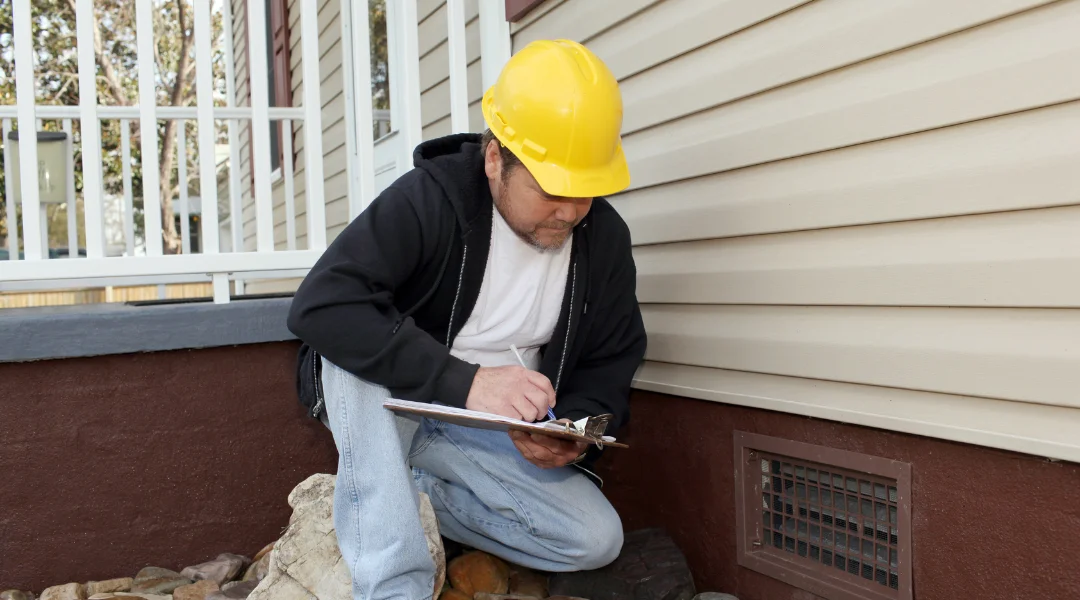Have you ever wondered what lies beneath the surface of your manufactured or mobile home? Understanding the importance of a mobile home inspection is crucial whether you are a current owner, a prospective buyer, or simply curious about the nuances of mobile homes.
In this article, we will understand everything about mobile home inspections, learning about the importance, types, costs, and advantages of hiring a qualified inspector. By the end, you’ll have gained valuable knowledge to protect your investment, save money, and ensure your and your loved ones’ safety.
What is a Mobile Home Inspection?

A mobile home inspection is a thorough examination of the condition, systems, and components of a mobile or manufactured home. It is usually carried out by a professional home inspector who evaluates various aspects of the home, such as structural integrity, electrical and plumbing systems, HVAC functionality, and so on.
A mobile home inspection’s goal is to identify any existing or potential problems, providing homeowners with valuable information about the condition of their homes.
According to our recent study, more than 25 million people in the United States will live in manufactured or mobile homes by 2024. This shows the importance of keeping your mobile home safe from any structural damage or health hazards.
Importance of Mobile and Manufactured Home Inspection
- Safety- Mobile home inspections help identify safety hazards such as faulty wiring, gas leaks, or structural weaknesses that could pose a risk to occupants.
- Preventive Maintenance- Regular inspections can detect minor issues before they escalate into costly repairs, saving homeowners both time and money.
- Negotiation Tool- Inspection reports can be used as leverage during price negotiations when buying or selling a mobile home.
- Compliance- Inspections ensure that mobile homes adhere to building codes, regulations, and safety standards.
- Insurance Requirements: Many insurance companies require an inspection before providing coverage for a mobile or manufactured home.
Types of Mobile Home Inspections
1. Visual Inspection – A general overview of the home’s exterior and interior, focusing on identifying any visible defects or areas that require further investigation.
2. Exterior Inspection – Assessing the exterior components, including roofing, siding, windows, doors, and overall structural integrity.
3. Interior Inspection – Evaluating the interior elements, such as walls, ceilings, floors, appliances, fixtures, and plumbing systems.
4. Electrical Inspection – Examining the electrical system, including wiring, outlets, switches, circuit breakers, and ensuring compliance with safety standards.
5. Plumbing Inspection – Assessing the plumbing system, checking for leaks, water pressure, drainage, and evaluating the condition of pipes and fixtures.
6. HVAC Inspection – Evaluating the heating, ventilation, and air conditioning systems for proper functioning, efficiency, and safety.
7. Structural Inspection – A comprehensive assessment of the structural components, including the foundation, walls, roof, and load-bearing elements.
8. Foundation Inspection – Examining the foundation for any cracks, unevenness, or signs of settlement that could affect the stability of the home.
9. Framing Inspection – Checking the integrity of the framing, beams, and supports to ensure they are structurally sound.
10. Other Structural Components Inspection – Assessing additional structural elements, such as stairs, decks, porches, or additions, for safety and compliance.
Costs of a Mobile Home Inspection
The cost of a mobile home inspection varies depending on the size of the home, its location, and the scope of the inspection. A mobile home inspection can cost between $250 and $500 on average. Additional fees may apply for specialized inspections or if the inspector identifies areas that require additional expert evaluation. Calculate the cost of a mobile home inspection using this calculator.
Benefits of Hiring a Qualified Mobile Home Inspector
- Expertise – Qualified inspectors have the knowledge and experience to thoroughly evaluate mobile and manufactured homes.
- Comprehensive Reporting – Inspectors provide detailed reports outlining the condition of the home, including any defects or safety concerns.
- Peace of Mind – A professional inspection offers reassurance to homeowners, ensuring that their investment is in good condition.
- Power of Negotiation– Inspection reports can be used as a negotiation tool when discussing repairs or adjusting the sale price.
- Save Time and Money– Identifying issues early on helps homeowners avoid costly repairs and potential health and safety risks.
- Compliance Assurance – A qualified inspector ensures that the home meets building codes and regulations.
- Unbiased Assessment – Professional inspectors provide an objective evaluation, free from personal biases or emotional attachments.
Common Problems Found in Mobile Homes
1. Foundation problems
- Cracks in the foundation
- Uneven or sloping floors
- Settling or shifting the home
2. Water damage
- Leaks or stains on ceilings, walls, or floors
- Mold or mildew growth
- Soft or spongy spots in the flooring
3. Wind damage
- Loose or damaged roofing materials
- Leaks around windows or doors
- Signs of exterior wall movement or damage
4. Electrical problems
- Outdated or unsafe wiring
- Faulty outlets or switches
- Inadequate electrical capacity for modern appliances
5. Plumbing problems
- Leaking pipes or fixtures
- Low water pressure
- Sewage system issues
6. HVAC problems
- Inefficient heating or cooling
- Malfunctioning thermostats
- Ductwork leaks or blockages
Mobile Home Inspection Checklist
Consider the following items on your mobile home inspection checklist to ensure a thorough inspection:
- Foundation – Check for cracks, settling, or signs of movement.
- Roofing – Inspect for leaks, damaged shingles, or deteriorating materials.
- Electrical System – Test outlets, switches, circuit breakers, and check for any safety hazards.
- Plumbing System – Assess water pressure, inspect for leaks, and ensure proper drainage.
- HVAC System – Check heating and cooling units, ductwork, and thermostat functionality.
- Exterior – Examine siding, windows, doors, decks, porches, and any visible structural components.
- Interior – Evaluate walls, ceilings, floors, appliances, fixtures, and overall condition.
How to Prepare for a Mobile Home Inspection

It is recommended that you prepare your mobile or manufactured home for an inspection before scheduling an inspection with a professional home inspector or an inspection company. Follow these preparation tips:
- Clean and declutter. Ensure the home is tidy and accessible for the inspector to navigate easily.
- Document repairs. Keep records of recent repairs or maintenance work done on the home.
- Clear obstructions. Remove obstacles blocking access to important areas like the attic, crawl spaces, or utility rooms.
- Provide documentation. Gather important documents, such as permits, warranties, and manuals for appliances or systems.
- Make utilities accessible. Ensure water, electricity, and gas connections are turned on for inspection purposes.
- Secure pets. Keep pets safely confined or arrange for them to be away during the inspection.
- Accompany the inspector. Be present during the inspection to address any concerns or questions.
What to Do After the Mobile Home Inspection
- Read the inspection report carefully, noting any areas of concern or recommended repairs.
- Consider seeking professional opinions or repair estimates if the inspector identified significant issues.
- Use the inspection report for negotiations with the seller, requesting repairs or adjusting the sale price.
- To ensure the safety of the occupants, address any safety hazards or urgent repairs first.
- Schedule routine inspections to identify and address potential problems before they become serious.
Types of Mobile Home Parks
There are several types of mobile homes, including single-wide, double-wide, and triple-wide homes. Each type has different sizes and layouts to accommodate different needs. Also, mobile home parks provide designated areas for mobile homes in communities, as well as amenities and services such as recreational facilities, maintenance, and security.
Financing Options for Mobile Homes
Financing a mobile home can be a bit different than financing a traditional home. There are a variety of options available, each with its own pros and cons. Here are the most common financing options for mobile homes, so you can choose the one that best suits your needs.
Chattel Loans – These loans are specifically designed for mobile homes and cover both the home and its transportation. They often have higher interest rates and shorter loan terms.
FHA Loans – Backed by the Federal Housing Administration, FHA loans offer favourable terms and lower down payment requirements for qualified borrowers.
Conventional Loans – Traditional mortgages can be used to finance mobile homes, especially if they are permanently affixed to a foundation and meet specific criteria.
VA Loans – Available to eligible veterans and active-duty military personnel, VA loans offer competitive interest rates and flexible financing options for mobile homes.
USDA Loans – The U.S. Department of Agriculture offers loans for mobile homes located in rural areas to promote homeownership in these regions.
Personal Loans – Some homeowners opt for personal loans to finance their mobile homes, especially for smaller loan amounts.
Seller Financing – In some cases, the seller may provide financing options, allowing the buyer to make payments directly to the seller.
How to Secure Financing for a Mobile Home Purchase
- Check Your Credit – Before applying for financing, review your credit report and address any issues or discrepancies.
- Lender Research – Look into various lenders, such as banks, credit unions, and online lenders, to find the best financing options for your needs.
- Prepare necessary documents such as proof of income, tax returns, bank statements, and identification.
- Pre-Approval – Get pre-approved for a loan to help you determine your budget and demonstrate your commitment as a buyer.
- Loan Offer Comparison – Compare loan terms, interest rates, down payment requirements, and closing costs from various lenders.
- Down Payment – Put money aside for a down payment, as lenders frequently require a percentage of the home’s purchase price upfront.
- Work with a Realtor or Loan Specialist – Seek advice from professionals who are familiar with mobile home financing.
Conclusion
I hope you found this comprehensive guide to mobile and manufactured home inspections useful. Remember that regular inspections and maintenance are critical for your home’s safety, longevity, and value. You can ensure a safe and comfortable living environment for you and your loved ones by prioritizing inspections and taking proactive measures.
Frequently Asked Questions
Q: What are the common misconceptions about Mobile Home Inspections?
Common misconceptions about mobile home inspections include believing that inspections are unnecessary for new homes, assuming that visual inspections are sufficient without specialized inspections, and believing that due to their factory construction, mobile homes are always in perfect condition.
Q: What questions to ask when buying a used mobile home?
When purchasing a used mobile home, inquire about the home’s age, condition, maintenance history, previous ownership, any renovations or repairs completed, the presence of warranties, lot rent or park fees, utility costs, and the availability of financing options.
Q: How do I estimate the value of my mobile home?
Age, condition, size, location, upgrades, amenities, and the overall market demand for mobile homes in your area should all be considered when estimating the value of your mobile home. Accurate estimates can be obtained by using online valuation tools, consulting with real estate professionals, or hiring a licensed appraiser.
Q: What are the moisture problems in mobile homes?
Roof leaks, plumbing leaks, condensation buildup, improper ventilation, inadequate insulation, and moisture infiltration through windows, doors, or exterior walls are all examples of moisture problems in mobile homes. If not addressed promptly, these problems can lead to mold growth, rot, and structural damage.
Q: What to look for when buying a used mobile home in Florida?
When purchasing a used mobile home in Florida, it is critical to inspect the home for hurricane or wind damage, check for proper tie-downs and anchoring, assess the roof’s condition, ensure compliance with Florida Building Code regulations, inspect for any signs of water damage or mold, and verify the home’s legal status and documentation.
Q: What is included in a mobile home inspection?
A typical mobile home inspection includes a thorough examination of the home’s exterior, interior, roofing, electrical systems, plumbing systems, HVAC systems, foundation, structural components, framing, and other relevant areas. The inspector writes a detailed report outlining any issues or concerns that were discovered during the inspection.
Q: How long does a mobile home inspection typically take?
The length of a mobile home inspection depends on its size, complexity, and condition. A mobile home inspection can take between 1.5 and 3 hours on average. Larger or more complex homes, on the other hand, may necessitate additional time for a thorough inspection.
Q: How often should a mobile home be inspected?
A mobile home should be inspected at least once a year to identify any potential problems or maintenance requirements. Inspections should also be performed before purchasing a used mobile home, following severe weather events, or if any specific concerns arise.
Q: What are some common issues found during mobile home inspections?
Common issues found during mobile home inspections include foundation problems such as cracks or settling, water damage from leaks or inadequate drainage, electrical system deficiencies, plumbing issues such as leaks or improper installations, HVAC system malfunctions, and structural problems related to the roof, walls, or flooring.
Q: How to inspect a mobile home before buying?
Before purchasing a mobile home, carefully inspect the exterior and interior for signs of damage, check the roof for leaks or deterioration, inspect the electrical and plumbing systems, test appliances, examine the condition of the flooring, walls, and ceilings, and ensure proper ventilation and insulation. It is also advisable to hire a professional mobile home inspector for a thorough inspection.




